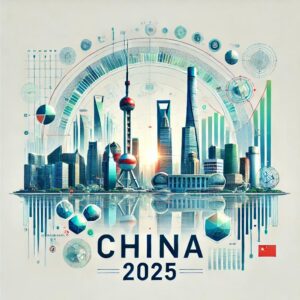Is Hong Kong Irrelevant?
I recently had a nearly two-hour conversation with a Beijing lawyer friend of mine. He’s with a Chinese law firm, and our talks often involve exchanging insights about our respective countries—both of us aiming to better understand emerging trends for our law firms’ future focus. I value these discussions highly as they enrich my understanding and occasionally challenge my assumptions.
During our call, we touched upon a variety of topics, but Hong Kong did not come up, except when we reflected on a past deal we worked on together.
When I got off the phone it struck me that we had not discussed Hong Kong because it doesn’t much matter anymore. Hong Kong seems to come up only when a PRC manufacturing company directs one of our clients to pay indirectly by paying to a Hong Kong company. See Paying Chinese Suppliers in Hong Kong for why this is a bad idea.
In August 2019, in what now seems like an eternity ago, we published Hong Kong for International Business: Stick a Fork in It, declaring what we saw as the end of Hong Kong as we knew it. At the time, what we said was incredibly controversial, and I received more hate comments, hate mail, and mockery for that post than for pretty much all other posts put together. One email from a Hong Kong lawyer stands out. He called me “a liar, a moron, and a know-nothing” and assured me I’d be proven wrong when Hong Kong’s status remained intact. Another
Others, however, praised our candor. One comment stuck with me: “I don’t know why it is that this blog is the one that always seems to be the one to say what everyone is thinking, but it is exactly that that puts this blog at the front of my reading list every morning.” My response was simple: “We’re not tied to China in the way many others are.”
We’ve always aimed to provide objective analysis, always doing our best to view issues through a fact-based lens, regardless of the region in question. This approach helps us maintain a balanced perspective whether we’re discussing Hong Kong, Mexico, or any other locale.
Looking back, the transformation in Hong Kong’s role as an international business hub has been profound, aligning with the observations we shared years ago. The territory’s economic and regulatory landscape has notably shifted:
- Hong Kong’s Economic Decline: Continuous retail sales decline and economic contractions reflect deeper systemic issues. See Hong Kong October retail sales fall 2.9% y/y.
- Financial Crime Concerns: The increasing focus on Hong Kong by U.S. lawmakers regarding financial crimes like money laundering is troubling. See Hong Kong Is Becoming Hub for Financial Crime, U.S. Lawmakers Say. My law firm’s internet fraud litigators are well-known for handling huge butchering the pig scam cases, and in nearly all of them, the stolen funds eventually go to Hong Kong.
- Shift of Assets to Singapore: With $4.1 trillion now managed out of Singapore, the financial sector’s preference is clear.
- Exodus of Foreign Firms: The implementation of the National Security Law in 2020 accelerated the migration of businesses to more stable environments. See e.g., Hong Kong’s legal exodus leaves law students with few places to go.
Diminished Autonomy: The erosion of legal and operational autonomy in Hong Kong has significantly impacted international confidence. See e.g., The United States Government’s Hong Kong Business Advisory. Or to put it more bluntly — and as I’ve heard so many say, “now that that Hong Kong is truly China, who needs it?”
The implications for international businesses are clear, and my role as lawyer is to help my clients navigate these changes per the following:
- Exploring Alternatives: Help our clients consider other cities for their operations, with many looking to Singapore or Bangkok.
- Preparing Evacuation Plans: Help our clients formulate their contingency plans.
- Reconsidering Arbitration Clauses: Help our clients negotiate out Hong Kong arbitration provisions in their existing clients and choose alternative dispute resolution locations in their future contracts.
- Understanding the Ramifications of the New Hong Kong: This mostly involves our helping our clients better understand the risks related to Hong Kong’s greatly reduced autonomy from the Mainland.
Hong Kong’s Uncertain Future
While the trajectory of Hong Kong’s decline as a global financial hub is evident, there are some who still believe that its deep integration with the Chinese economy, particularly within the Greater Bay Area, could provide it with new opportunities for growth and development. Additionally, the city’s strong infrastructure, skilled workforce, and still somewhat respected legal system could continue to attract certain types of businesses, particularly those focused on high-value-added services and specialized industries.
However, the geopolitical tensions between the United States and China, as well as the increasing influence of the Chinese Communist Party over Hong Kong’s affairs, pose significant challenges to the city’s long-term prospects. The erosion of the “one country, two systems” principle and the imposition of the National Security Law have raised concerns about the rule of law, freedom of speech, and the independent judiciary in Hong Kong. These factors, coupled with the increasing economic and political uncertainty in the region, have led many international businesses to reassess their operations in Hong Kong and seek alternative locations.
Conclusion
In 2019, my predictions were met with skepticism and hostility. But today, the evidence of Hong Kong’s transformation is undeniable. While I admit to taking satisfaction in seeing my earlier predictions validated, this post primarily aims to highlight the critical need for adaptability, both in the face of rapid transformations.
It is also a call to arms to get businesses to think more openly on issues going forward. This post is meant to underscore the importance of adaptability in business decisions. A constantly evolving international business landscape requires a proactive and prepared approach. As the global dynamics continue to evolve, so must our strategies and recommendations. If you are not keeping up, you are falling behind.
For most of our American clients, their big issue will be Round Two of the Trump tariffs. For insights and strategic advice on navigating new tariffs, I urge you to check out Trump’s New Tariffs and Their Impact on U.S. Trade with China, Mexico, and Canada and How to Use The New China Tariffs to REDUCE Your China Manufacturing Costs.

























